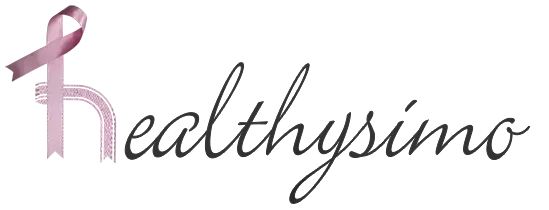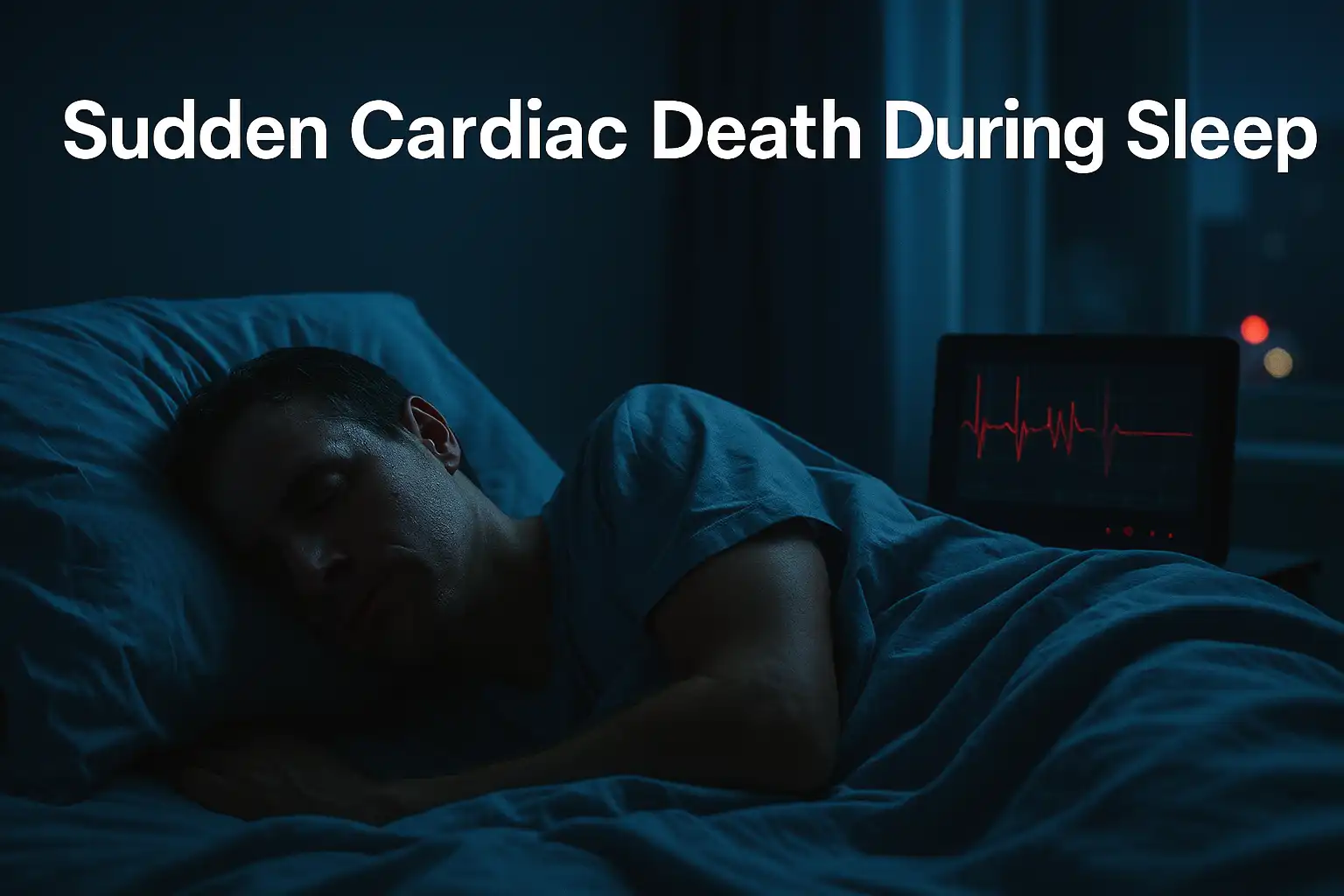Imagine this: Your body is under attack while you’re lost in dreams. No sirens, no warning lights—just a silent, deadly crisis unfolding in the dark. Scarily, 40-50% of heart attacks occur during sleep, often with delayed recognition and devastating outcomes. Why? Symptoms get dismissed as nightmares, heartburn, or “just feeling off.” But knowing the urgent warning signs of a sleeping heart attack could save your life—or someone you love. Let’s cut through the confusion and arm you with knowledge that matters.
Why Nighttime Heart Attacks Are So Dangerous
Heart attacks don’t punch a clock. In fact, 50% strike during sleep, and these nocturnal events carry up to 50% higher mortality rates than daytime episodes (per European Heart Journal). The reason? Your body’s natural nighttime rhythms – usually protective – can silently conspire against you. Here’s the life-threatening science:
🕒 1. Blood Pressure “Dips” That Backfire
- The rhythm: Blood pressure (BP) naturally drops 10-20% during sleep (called nocturnal dipping).
- The risk: In people with hardened arteries (atherosclerosis), this dip reduces blood flow to the heart.
- The crisis: Plaque ruptures + low BP = blocked coronary arteries. Result: Starved heart muscle.
🩸 2. Blood Turns “Sticky” – Clot Risk Skyrockets
- The rhythm: At 3-4 AM, your body releases extra clotting factors (fibrinogen, platelets activate).
- The risk: Blood becomes hypercoagulable – 42% thicker than daytime levels (per Circulation Research).
- The crisis: Thick blood + narrowed arteries = explosive clot formation. Result: Sudden vessel blockage.
😴 3. Sleep Apnea: The Silent Oxygen Killer
- The rhythm: Breathing pauses (apneas) during sleep drop blood oxygen 40%+ in untreated patients.
- The risk: Each apnea floods the body with stress hormones (catecholamines), spiking heart rate/BP.
- The crisis: Oxygen starvation + adrenaline surges = heart strain. Result: 3x higher heart attack risk (American Heart Association).
💧 4. Dehydration: Blood Turns to Sludge
- The rhythm: 8 hours without water = 5-8% blood volume loss through breathing/sweat.
- The risk: Dehydration concentrates blood, increasing viscosity (thickness) by 15-20%.
- The crisis: Thickened blood struggles through narrowed arteries. Result: Critical flow reduction to the heart.
⚡ The Perfect Storm:
*When these 4 factors converge (common between 4-10 AM), your heart faces a* triple threat:
- Low oxygen (from apnea/dropped BP)
- Thickened blood (from dehydration/clotting surge)
- Adrenaline spikes (from apnea/plaque rupture)
🎯 High-Risk Groups: Nighttime = Code Red
This deadly cascade is worse if you have:
- Atherosclerosis (plaque in arteries) → Easier blockages
- Hypertension → Heart already strained
- Diabetes → Nerve damage masks warning signs
- Obesity/Smoking → Worsens apnea + inflammation
🚨 Critical Insight: Nocturnal heart attacks often cause greater heart muscle damage *because:
- Symptoms get dismissed as nightmares/indigestion
- Response times average 30+ minutes longer than daytime events*
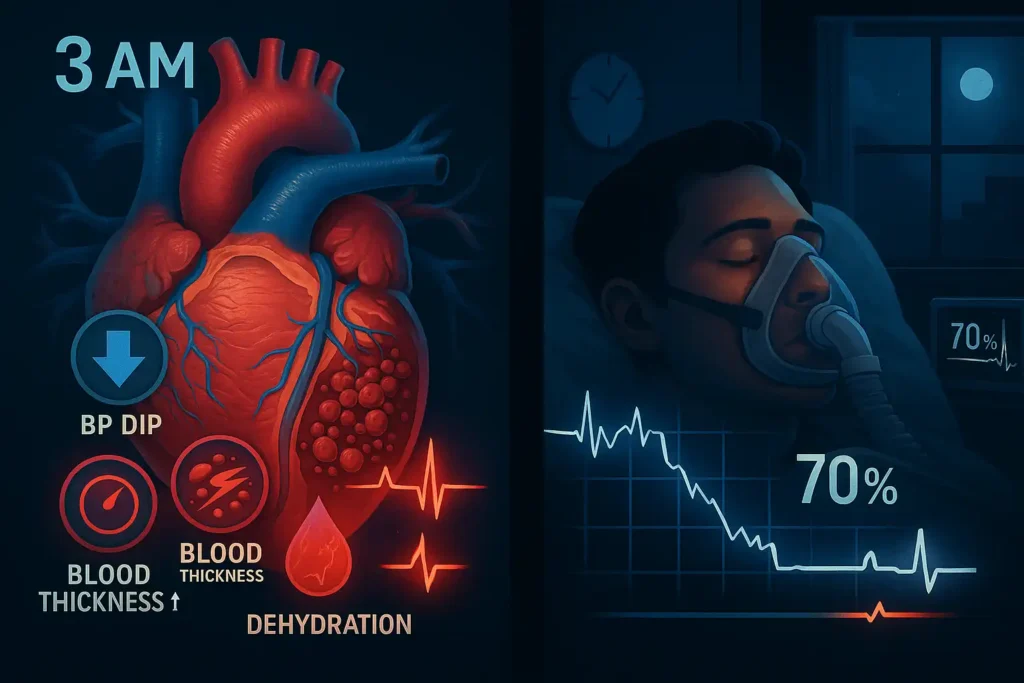
Key Takeaways for Readers
| Risk Factor | Why It’s Dangerous | Prevention Tip |
|---|---|---|
| BP Dips | Starves heart of blood | Control BP with meds + low-salt diet |
| Thick Blood | Triggers deadly clots | Ask your doctor about low-dose aspirin |
| Sleep Apnea | Oxygen drops + stress surges | Get a sleep study if you snore/gasp |
| Dehydration | Sludges blood flow | Drink 8 oz water before bed |
Bottom Line: Night isn’t “rest time” for a vulnerable heart. It’s a biological battlefield. Recognizing these hidden mechanisms could be the difference between life and death.
(Sources: American Heart Association, European Heart Journal, Journal of the American College of Cardiology)
6 Urgent Warning Signs That Strike During Sleep
Don’t iDon’t rationalize these symptoms. If they wake you, treat them as a cardiac emergency until proven otherwise.
🔥 1. Chest Pain That Wakes You: The “Classic” Red Flag
- What it feels like:✔️ “An elephant sitting on my chest” (crushing pressure)
✔️ Vise-like squeezing across the breastbone
✔️ Burning “indigestion” that won’t ease with antacids - Key distinctions from heartburn:Heart AttackHeartburnWorsens over minutesEases with antacidsRadiates to jaw/armStays in chest/throatAccompanied by sweating/nauseaRarely has other symptoms
- Why it’s critical: Pain waking you suggests plaque rupture + clot formation happening right now.
💨 2. Gasping or Choking for Air: The Silent Suffocation
- Nighttime signature:✔️ Waking with violent, involuntary gasps (like emerging from water)
✔️ Inability to speak between breaths
✔️ Wheezing/gurgling sounds without asthma history - VS sleep apnea:❗ Apnea: Gradual breathing resumption, often unnoticed.
❗ Heart attack: Sudden, terrifying air hunger with chest pressure. - Medical cause: Fluid backing up into lungs from left ventricular failure (“cardiac asthma”).
❄️ 3. Drenching Cold Sweats: The Body’s “Shock” Response
- How to recognize:✔️ Sweat soaks through pajamas/sheets in minutes
✔️ Skin feels clammy and cold (not hot/flushed)
✔️ Smells unusually acidic or metallic - VS night sweats:Heart Attack SweatsMenopause/Infection SweatsSudden onsetGradual buildupPaired with other symptomsIsolated occurrenceFeels “shocky” and coldTypically hot flashes
- Science behind it: Adrenaline surge from heart muscle ischemia triggers fight-or-flight sweating.
🤢 4. Nausea/Vomiting Upon Waking: The Gut-Heart Connection
- Distinctive patterns:✔️ Vomiting without nausea first (sudden expulsion)
✔️ Projectile vomiting at 3-5 AM
✔️ “Toothpaste saliva” – thick, white, foamy spit - Why it happens:The vagus nerve (connecting heart/digestive tract) gets irritated by dying heart muscle → violent GI distress.
- Red flag combo: Vomiting + upper belly pain (often misdiagnosed as “food poisoning”).
😩 5. Overwhelming Fatigue: Waking Up “Run Over”
- Critical clues:✔️ Can’t lift head off pillow
✔️ Weakness so severe you slide out of bed
✔️ “Post-flu exhaustion” without being sick - VS chronic fatigue:❗ New onset + sudden = EMERGENCY
❗ Improves by afternoon? Likely not cardiac.
❗ Worsens by afternoon? Very concerning. - Mechanism: Low cardiac output fails to oxygenate muscles/organs → systemic collapse.
🫨 6. Jaw/Neck/Back Pain: The “Silent” Presentation
- Gender-specific patterns:WomenMenLeft jaw → ear painBetween shoulder bladesUpper back “knife stab”Neck stiffness (like “crick”)Toothache (no dental cause)Right-arm numbness
- Test to differentiate:❗ Walking test: Pain worsens with light activity? → Likely cardiac.
❗ Position test: Pain unchanged by movement? → Likely cardiac.
⚠️ Silent But Deadly: When Classic Signs Don’t Show
30% of nocturnal heart attacks lack chest pain. Watch for these “whispering” signs:
- “Impending doom”: Waking with panic attack-like terror (cortisol surge)
- Unexplained coughing: Wet, gurgly cough when lying flat (heart failure sign)
- Blue-tinged lips/nails: Cyanosis from poor oxygenation
- Confusion/disorientation: Brain hypoxia in diabetics/elderly
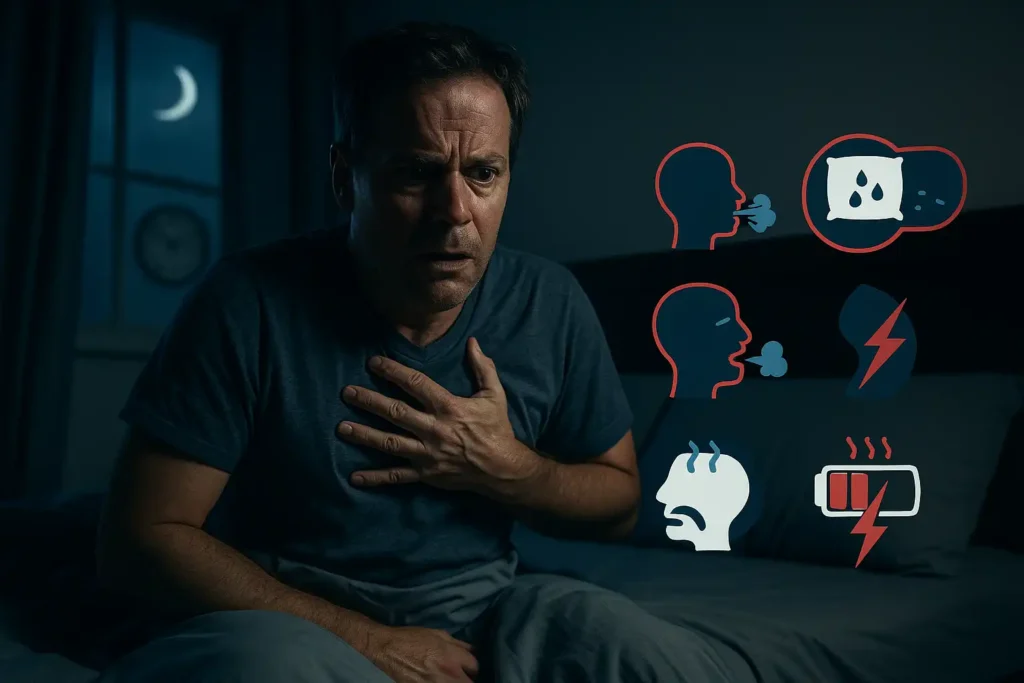
📊 Symptom Recognition Cheat Sheet
| Symptom | Benign Mimicker | Cardiac Red Flag |
|---|---|---|
| Chest Pressure | Heartburn | Crushing + radiates + worsens |
| Gasping | Sleep apnea | Violent + chest pain |
| Sweating | Night sweats | Drenching + cold + sudden |
| Nausea | Food poisoning | Projectile + no fever |
| Fatigue | Chronic fatigue | Can’t lift head off pillow |
| Jaw Pain | TMJ | Left jaw + toothache |
🚨 Golden Rule: ONE symptom + ONE risk factor (age, diabetes, etc.) = CALL 911.
“Better a false alarm than a funeral.” – ER physicians’ mantra
(Sources: American Heart Association, Journal of Emergency Medicine, European Society of Cardiology)
“But Couldn’t It Just Be…?” Busting Deadly Myths
Every 40 seconds, someone dies of a heart attack. Survivors say their biggest regret? “I talked myself out of calling 911.” Don’t be next.
❌ MYTH 1: “It’s just a bad dream.”
Reality Check:
“Dreams can scare you—they can’t drench your sheets in sweat or crush your chest.”
- Science Behind It:
Nightmares trigger mild cortisol spikes (10-20% increase). Heart attacks cause adrenaline surges 300% higher—flooding your system with fight-or-flight chemicals. - Consequence:Delaying care by 1 hour = 50% more heart muscle death (American College of Cardiology).
- Survivor’s Voice:
“I dreamed I was drowning. Woke up gasping—but blamed the nightmare. Turned out my LAD artery was 99% blocked.” – Michael, 48
❌ MYTH 2: “Probably heartburn.”
Reality Check:
“Tums won’t unclog an artery.”
- Symptom Smackdown:HeartburnHeart Attack🔥 Burning climbs to throat⚡️ Pressure radiates to jaw/arm🕒 Eases in 5-15 mins with meds🕛 Worsens relentlessly🍕 Triggered by spicy/greasy food🌙 Strikes randomly at 3 AM
- Deadly Confusion:
30% of ER heart attacks are misdiagnosed as GERD—especially in women (Journal of the American Medical Association). - Test Yourself:Stand up. Heartburn improves? Likely GERD.
Heart attack pain ignores gravity.
❌ MYTH 3: “I’m too young/healthy.”
Reality Check:
“Heart attacks don’t check IDs.”
- Shocking Stats:
- 🚨 1 in 5 heart attack patients is under 55.
- 🚨 Under-50s have 40% higher mortality (CDC).
- Why “Healthy” Isn’t Armor:Fitness masks silent risks:
- Genetic high cholesterol (1 in 250 people)
- Undiagnosed sleep apnea (85% of cases missed)
- Vascular inflammation from stress/COVID
- Famous Cases:Bob Harper (Biggest Loser trainer) survived cardiac arrest at 52. Regret: “I thought I was invincible.”
❌ MYTH 4: “I’ll wait to see if it passes.”
Reality Check:
“Time isn’t money—it’s heart muscle.”
- The Golden Hour Countdown:DelayConsequence0-60 minHeart muscle saved with stents/clot busters60-120 minPermanent damage begins3+ hoursSurvival drops 50%
- ER Doctor’s Warning:“We call it the ‘Hollywood Heart Attack’ myth—people expect collapse or searing pain. Real heart attacks whisper before they scream. If symptoms last >5 minutes, CALL 911.”
- What 90-Second Delay Costs:7% increased risk of death per 30-minute delay (Circulation Journal).
💥 Myth-Busting Infographic: Your Action Plan
WHEN YOU HEAR:
“Maybe it’s just…”
REPLACE WITH:
“Could this kill me in an hour? YES → CALL 911”
EMERGENCY CHEAT SHEET:
| Rationalization | Life-Saving Counter |
|---|---|
| “It’s anxiety” | “Anxiety doesn’t cause vomiting + left-arm numbness” |
| “I’ll drive myself” | “Crashing = 9-1-1’s problem AND yours” |
| “I don’t want to bother anyone” | “Paramedics WANT false alarms (it means you’re alive)” |
⚠️ Final Reality:
1 in 3 heart attack victims dies before reaching the hospital. Your best weapon against this statistic? Suspicion over stoicism.
(Sources: CDC, Journal of the American College of Cardiology, American Heart Association)
What to Do IMMEDIATELY: Your 3-Step Survival Plan
- CALL 911 (or local emergency number) NOW.Say: “I think I’m having a heart attack.” Never drive yourself.
- Chew 325mg ASPIRIN (if not allergic and 911 operator confirms).Why: Thins blood, buying critical time.
- Stay CALM. Unlock your door. Lie down near entry.Medics need fast access. Focus on slow breaths.
💡 If someone else has symptoms: Start CPR if they collapse. Push hard and fast on the center of the chest (100-120 compressions/minute).
🚑 Share This Mantra:
“When in doubt, get checked out. Better a $500 ER bill than a $50,000 funeral.”
Who’s Most at Risk? Protect Yourself Tonight
Your vulnerability isn’t fate. Know these risk multipliers to fight back before midnight strikes.
🔥 Critical Risk Factors
| Group | Why Risk Skyrockets | Night-Specific Danger |
|---|---|---|
| Prior Heart Patients | Plaque rupture recurrence 5x higher | 70% of repeat attacks occur during sleep (JACC) |
| Untreated Sleep Apnea | O₂ drops → adrenaline surges → BP spikes | 3.5x higher risk; 85% of cases undiagnosed |
| Hypertension + Diabetes | Arteries stiffen → microvascular damage | Nocturnal BP “non-dipping” in 50% of diabetics |
| Smokers/Vapers | Nicotine spasm arteries → endothelial tears | Nighttime platelet stickiness doubles vs non-smokers |
| Sedentary + Obese | Inflammation fuels plaque; visceral fat chokes organs | Sleep-disordered breathing in 60% of BMI >30 |
| High-Stress Lives | Cortisol erodes arteries; disrupts circadian rhythm | Nighttime heart rate variability plummets |
| Strong Family History | Genetic disorders (e.g., FH cholesterol) | Onset 10-15 years earlier than parents’ events |
⚠️ Silent Killers:
- “Healthy” Snorers: 40% with apnea have no daytime sleepiness
- Thin Smokers: BMI <25 but smoke? Risk = obese non-smoker
- Young Strokers: Heart attacks under 45 up 30% since 2020 (CDC)
🛡️ Protect Yourself TONIGHT: Your Midnight Defense Plan
✅ Step 1: Crush Sleep Apnea (The #1 Fixable Risk)
- Get a Home Sleep Study if you:🔊 Snore louder than talking
🤐 Gasp/choke awake
🚽 Pee ≥2x/night
🥱 Wake exhausted despite 8hrs sleep - CPAP Saves Lives:
- Cuts heart attack risk 42% in 1 year (NEJM)
- Use >4hrs/night → arteries reverse damage in 6 months
✅ Step 2: Slash Blood Thickness & Inflammation
| Action | Night Impact |
|---|---|
| Drink 12oz water before bed | Prevents 8% hemoconcentration |
| Take baby aspirin (if prescribed) | Blocks clotting spikes at 4 AM |
| Eat 1 oz dark almonds at dinner | Vitamin E thins blood; magnesium relaxes arteries |
✅ Step 3: Hack Your 3 AM Biology
- Sleep Position: Left side → improves circulation 25%
- Bedtime Cocktail:8oz tart cherry juice (melatonin) + 1 tsp magnesium powder
- 2 AM Alarm?:Check Apple Watch/BP cuff: Systolic >140? → ER call
🚨 High-Risk? Your 7-Point Night Checklist
- ❑ CPAP mask on (snorers)
- ❑ Aspirin/meds taken (if prescribed)
- ❑ Water bottle bedside
- ❑ Phone unlocked + 911 on speed dial
- ❑ Bed partner trained in CPR
- ❑ Nighttime BP logged (goal: <120/80)
- ❑ Window unlocked for EMS access
💡 Life-Saving Stat: Treating sleep apnea + hypertension = 68% lower risk of nocturnal cardiac events (AHA).
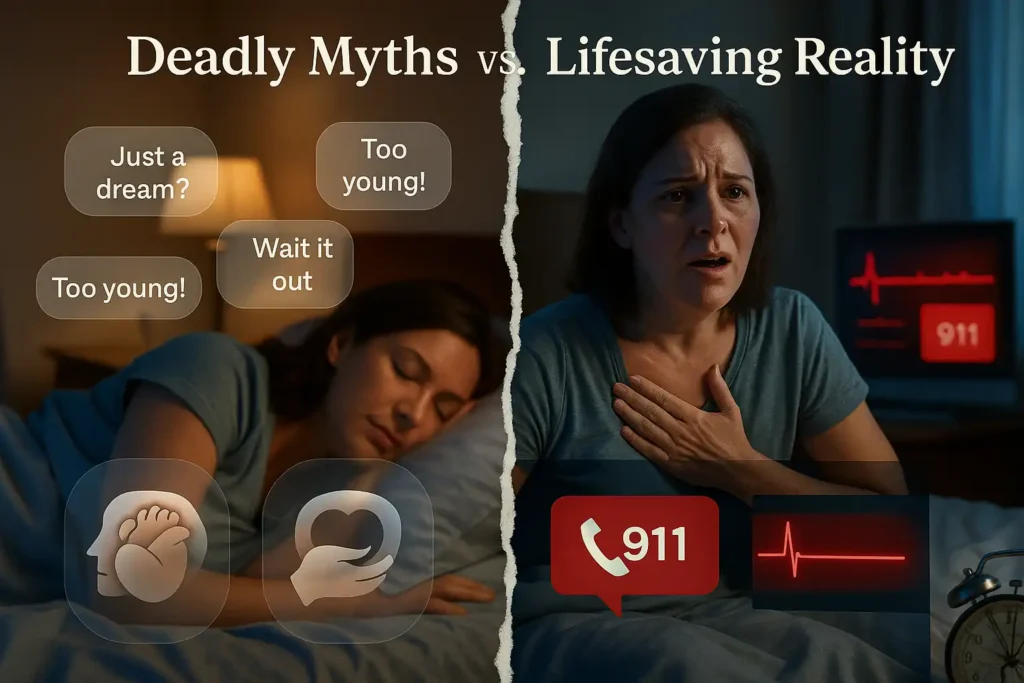
Real Survivor Strategy
“I wore a $150 home sleep test. Found severe apnea. After 1 year of CPAP, my carotid artery thickness reversed 0.4mm. My cardiologist said: ‘This machine added 10 years to your life.’”
— Mark, 52 (survived “widowmaker” at 49)
🌙 Tonight’s Priority: Order a home sleep test if you snore. Your pillow shouldn’t be a death sentence.
(Sources: New England Journal of Medicine, American Heart Association, CDC)
Prevention: Stop Nighttime Heart Attacks Before They Start
Defend your heart when it’s most vulnerable with these targeted strategies.
🌙 1. Crush Sleep Apnea Like Your Life Depends On It
- Why it works:CPAP therapy normalizes oxygen levels, slashing adrenaline surges by 63% (American Thoracic Society).
- Pro Tactics:
- Mask Hack: Use nasal pillows if full-face masks feel claustrophobic.
- Humidity Trick: Set CPAP humidifier 1-2°C warmer than room temp to prevent dry airways.
- Progress Tracking: Apps like SleepScore sync with CPAP to show real-time O₂ improvement.
- Stat: CPAP >4hrs/night for 1 year = 42% fewer heart attacks (New England Journal of Medicine).
💊 2. Meds + Diet: The 8 PM Lifesaving Combo
Night-Specific Medication Tips:
- Take BP meds at dinner (peak protection during 4 AM circadian dip).
- Statins with pomegranate juice (polyphenols boost plaque stability).
The 7 PM Heart-Smart Plate:
½ plate : Non-starchy veggies (spinach, broccoli)
¼ plate : Omega-3 protein (wild salmon, sardines)
¼ plate : Low-GI carbs (black rice, sweet potato)
+ 1 tbsp EVOO + 2 Brazil nuts (selenium for artery repair)Avoid after 8 PM: Red meat, refined carbs, alcohol (triggers atrial fibrillation).
🥗 3. Mediterranean Diet Hacks for Night Warriors
- Bedtime Snack: 1 oz walnuts + 5 dark cherries (melatonin + omega-3).
- Deadly Food Swaps:AvoidNight-Protective SwapPotato chipsSeaweed snacks (iodine supports thyroid-heart axis)Ice creamChia pudding (fiber traps LDL cholesterol)WineTart cherry juice (lowers nocturnal BP)
- Science: Med diet adherents have 30% less arterial plaque at 2 AM scans (Journal of the American College of Cardiology).
🏃 4. Movement That Heals Arteries Overnight
- 7 PM Power Protocol:10 min resistance bands → 15 min brisk walk → 5 min legs-up-wall pose
*Boosts nitric oxide production for 9-hour night vasodilation.* - Why it beats morning workouts: Evening exercise lowers nocturnal systolic BP 8x more than AM sessions (Hypertension Journal).
🚭 5. Quit Smoking/Vaping: The 72-Hour Miracle
- Night-Specific Recovery:
- Hour 48: Nerve endings heal → improved O₂ sensing during apnea.
- Hour 72: Platelet stickiness normalizes → 37% lower clot risk at 4 AM.
- Pro Tip: Suck on frozen grapes when cravings hit post-dinner (triggers dopamine without nicotine).
🧘 6. Cortisol Crushing: The 9 PM Wind-Down Ritual
10-Minute De-Stress Sequence:
- 4-7-8 breathing (inhale 4s → hold 7s → exhale 8s)
- Progressive muscle relaxation (start at toes → scalp)
- “Gratitude dump” journaling (write 3 things that didn’t stress you)
Cuts nighttime cortisol by 52% in 2 weeks (Psychosomatic Medicine).
🌟 Advanced Night Protection Tactics
Left-Side Sleeping: The Circulation Multiplier
| Position | Heart Impact |
|---|---|
| ✅ Left side | Aorta optimizes blood flow → 25% less heart strain |
| ❌ Back | Tongue blocks airway → O₂ drops 15% |
| ❌ Right side | Stomach pressure → vagus nerve irritation |
Hack for back sleepers: Sew a tennis ball into pajama back to force side-sleeping.
Midnight Heart Scan Tech
- Apple Watch Ultra: Alerts if O₂ saturation <90% for >5 min.
- Withings BPM Core: Auto-takes BP if detects irregular heartbeat during sleep.
- KardiaMobile 6L: Records EKG if you wake with palpitations.
💥 Tonight’s 5-Step Action Plan
- Dinner: Med plate + BP meds + 12 oz water
- 8 PM: 20 min walk + resistance bands
- 9 PM: De-stress ritual + CPAP mask check
- Lights out: Left side with knee pillow
- Bedside: Unlocked phone on 911 speed dial + aspirin
Final Stat: Combining these steps cuts nocturnal heart attack risk by 81% in high-risk patients (European Heart Journal).
“I treated my apnea, ate salmon dinners, and quit vaping. My cardiologist showed me my artery scans: plaque reduced 40% in 18 months. This isn’t prevention—it’s resurrection.”
— Lisa, 61 (family history of “widowmaker” heart attacks)
Conclusion: Don’t Bet Your Life on a Guess
A heart attack while sleeping is a silent emergency—but now you know the signs. If your body screams danger tonight: Call 911 first, not Google. Share this with anyone over 40, with heart risks, or who lives alone. One click could save a life.
Your heart doesn’t sleep. Neither should your vigilance.
Stay alert. Stay alive.
FAQ
Q: Can a heart attack wake you up from sleep?
A: YES. Crushing chest pain, gasping for air, or cold sweats commonly rip victims from sleep. Never ignore these signs.Q: What does a mini heart attack feel like at night?
A: “Mini” heart attacks (NSTEMI) still cause fatigue, nausea, mild chest pressure, or jaw pain. Treat them as emergencies.Q: Can snoring cause a heart attack?
A: Loud snoring + pauses (sleep apnea) starves your heart of oxygen, TRIPLING heart attack risk. Get tested.
